Aug 19, 2025
Author:Jackson Watson
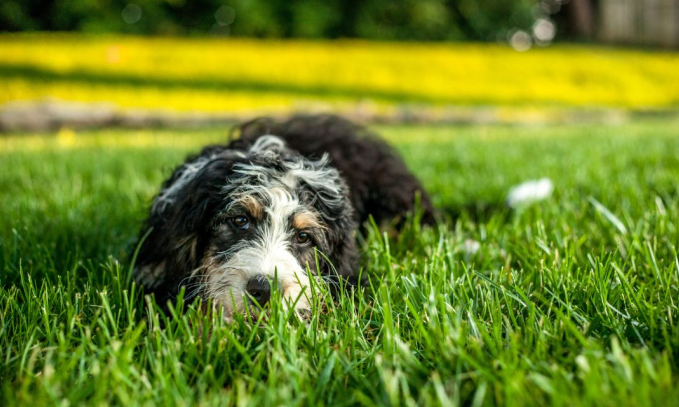
Picture this: a dog with Bernese Mountain Dog loyalty, Poodle-level brains, and a shaggy, teddy bear coat that hardly sheds. Too good to be true? That’s exactly what Bernedoodle owners said—right before they brought one home. These big-hearted giants are quietly changing what families expect from a four-legged companion.
But here's the catch—Bernedoodles aren't your average designer breed. They come with quirks, needs, and surprises that can blindside unprepared owners.
What we'll cover:
● Temperament traits and energy levels that shape daily life
● Grooming requirements and real maintenance costs
● Training challenges and health considerations
● Size variations and how to pick the right one for your lifestyle
Keep reading if you want the unfiltered truth about Bernedoodles. We're about to save you from expensive mistakes and set you up for success with these curly-coated charmers.
The Bernedoodle Personality Blueprint
Look, understanding a Bernedoodle's temperament? It means accepting you're getting two breeds rolled into one fluffy package. These dogs inherit this wild mix of traits. Complex personalities emerge. Trust me on this one.
Social Butterflies With a Twist
Bernedoodles thrive on human connection—but wait, they're picky about it. You'll see them bond like crazy with their immediate family. Strangers? Polite distance. Not shyness, though. It's a calculated observation, actually.
Their social needs? Let me break it down:
● Family time: 3-4 hours direct interaction daily (yes, really)
● Stranger comfort zone: Takes maybe 2-3 meetings before they warm up
● Child compatibility: Excellent—toddlers need supervision, though
● Pet dynamics: Early socialization at 8 weeks works best
Pro tip: Schedule those playdates during puppyhood. Miss the early socialization window and boom—velcro dog following you everywhere.
Energy Levels That Defy Expectations
Lazy doodles—whoever said that never owned one. Bernedoodles pack energy into those fluffy frames. Ages 1-3? Buckle up. Exercise needs totally depend on which size you get.
● Standard Bernedoodles (70-90 lbs) need 60-90 minutes of activity. Every single day. Morning walks, afternoon play—split it up however. Weekend hikes? They'll do 5 miles then crash like they've run a marathon.
● Mini Bernedoodles (25-49 lbs)? Different story. Intense 20-minute energy bursts. Then they recharge. Like smartphones, seriously. Three short sessions work way better than dragging them on one long walk.
● Tiny Bernedoodles (10-24 lbs) have this terrier energy trapped in petite bodies. Mental games matter more than wearing them out physically.
The Intelligence Factor
Poodle genes really show here. Bernedoodles pick up commands in 5-15 repetitions. Average dogs? 25-40. Intelligence is a double-edged sword, though.
Smart dogs get bored fast. And bored Bernedoodles? They become:
● Escape artists are figuring out every gate latch
● Selective listeners who suddenly forget sit means sit
● Cabinet raiders who've mastered doorknobs
Channel the brainpower—puzzle feeders, nose work, rotate toys weekly. New tricks every month. Keeps their minds busy, prevents them from redecorating your house their way.
Emotional Intelligence Off the Charts
These dogs read rooms. Better than some people I know. Mood shifts? They sense them. Energy adjustments happen automatically. Comfort gets offered without anyone teaching them how. Therapy dog material right there.
Bad day? Watch what happens. Toys appear. Heads land on laps. Sometimes they just... exist nearby, quietly. Not a coincidence—it's literally in their DNA.
The bottom line? Bernedoodles need owners who get their complexity. Not couch potatoes. Not marathon runners either. Neither completely aloof nor stage-5 clingers. Perfectly balanced—when you understand their rhythm.
The Real Cost of That Teddy Bear Coat
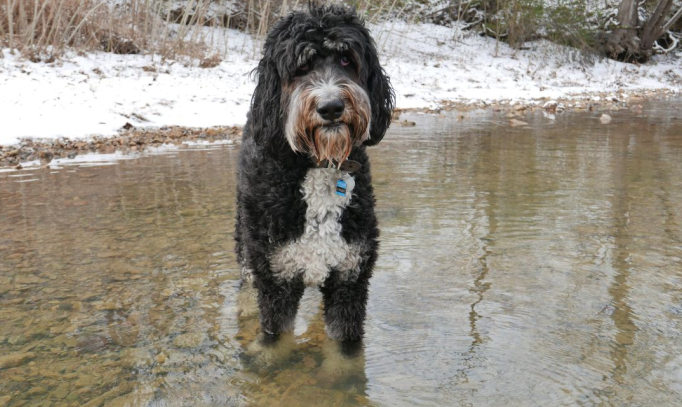
That gorgeous coat? Most breeders conveniently skip the price tag discussion. We're not just talking money here—time, effort, complete lifestyle adjustments. New owners get blindsided constantly.
Breaking Down the Grooming Marathon
Three coat types exist. Each one demands something different maintenance-wise. Which genetic lottery ticket did your pup pull?
● Wavy coats (most common) need brushing 3-4 times per week, minimum. Skip a week? Hours of mat detangling await.
● Curly coats demand daily brushing. No exceptions, no excuses.
● Straight coats shed more. But hey, twice-weekly brushing works.
Reality check time:
|
Coat Type |
Weekly Time Investment |
Mat Risk |
Shedding Level |
|
Curly |
3-5 hours |
High |
Minimal |
|
Wavy |
2-3 hours |
Medium |
Low |
|
Straight |
1-2 hours |
Low |
Moderate |
Professional Grooming or DIY Disaster
Professional grooming? $75-$200 per session. Location matters. Dog size matters more. Standards always hit that higher end. Every 6-8 weeks means $600-$1,600 annually.
Think you'll groom at home? Equipment costs hurt:
● Professional clippers: $150-$300
● Grooming table: $100-$200
● Complete brush set: $50-$100
● Thinning shears, scissors: $75-$150
Total startup: $375-$750. Plus YouTube University. Plus, practice runs where your dog looks... interesting.
Hidden Maintenance Expenses
Beyond basic grooming, costs pile up fast. Those mat-prone ears? Weekly cleaning with special solutions ($15 monthly). Light-colored dogs get tear stains—daily wipe-downs, stain removers ($20 monthly).
Poodle genetics mean dental issues. Professional cleanings run $300-$800 yearly. Or buy quality dental chews—$30 monthly.
The Time Tax Nobody Mentions
Morning brushing—15-20 minutes gone. Weekly ear cleaning adds 10. Nail trimming? 15 minutes. Tooth brushing three times weekly for 5 minutes each. Math says 3-4 hours weekly just on maintenance.
Bath day, though? Clear your schedule. 2-3 hours for washing, drying, and brushing. That coat holds water like nobody's business. Air drying equals mats and skin problems. High-velocity dryer ($100-$200) or marathon blow-dry sessions—pick one.
Reality check: Budget $2,000-$3,000 annually for grooming stuff. Plus 4-5 hours every week. Too much? Maybe Bernedoodles aren't your breed—and that's totally fine.
Training Quirks and Health Hurdles
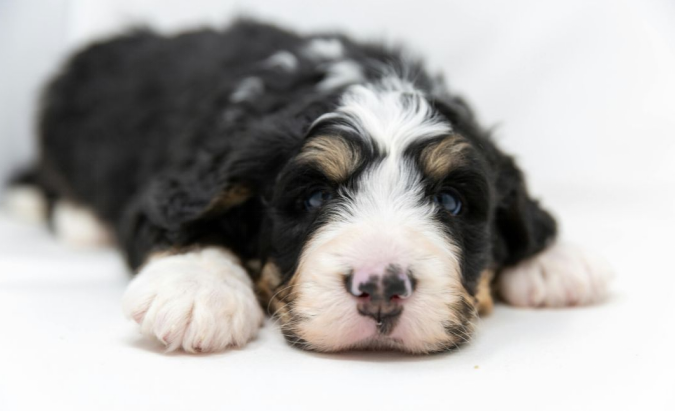
Smart dogs? Terrible students when bored. Bernedoodles got Poodle brains and Bernese stubbornness. Basic training becomes psychological warfare sometimes.
The Stubborn Genius Paradox
Lightning-fast learners who selectively forget when unmotivated. Perfect performance for treats. Ask without payment? Blank stares. Not defiance exactly—more like negotiation.
Training roadblocks you'll hit:
● Selective hearing: Only responds when beneficial
● Boundary testing: Rules need verification every time. single. time.
● Command overthinking: Weighing if compliance pays off
● Manipulative charm: Avoiding tasks through cuteness
Training hack: Mix up rewards randomly. Treat, praise, play—keep them guessing. Unpredictability maintains engagement.
Adolescent Rebellion Phase
8-18 months—your angel becomes a teenager. Commands? Forgotten. Leash manners? Gone. Every boundary gets tested repeatedly.
Consistency without frustration—that's the key. Most owners crack here. Creates lifelong issues. Stay firm. Regression is temporary... if structure stays solid.
Working professionals juggling training? Smart feeders like the WOpet Heritage View Automatic Pet Feeder maintain meal consistency. Built-in cameras let you watch behavior patterns. Two-way audio reinforces training during work hours.

Health Vulnerabilities Worth Knowing
Hybrid vigor helps somewhat. But both parent breeds pass down health risks. Know them—financially and emotionally prepare yourself.
|
Health Concern |
Risk Level |
Age of Onset |
Treatment Cost Range |
|
Hip Dysplasia |
Moderate |
1-2 years |
$1,500-$6,000 |
|
Progressive Retinal Atrophy |
Low-Moderate |
3-5 years |
$2,000-$3,000 |
|
Bloat (GDV) |
Moderate |
Any age |
$1,500-$7,500 |
|
Skin Allergies |
High |
6 months+ |
$50-$200/month |
Preventive Care Protocol
Early intervention always beats expensive treatments later. Hip uations at 12 months—schedule them. Joint supplements by age 2 ($30-$50 monthly). Watch eating speed. Bernedoodles inhale food—bloat risk increases.
Skin allergies hit 30-40% of Bernedoodles. Excessive scratching, hot spots, ear infections—watch for signs. Food trials identify triggers. Expect 2-3 months experimenting, though. Mental health counts too. Separation anxiety? Rampant in this breed. Independence training starts day one. Leave 30 seconds. Return. Repeat. Gradually increase. Skip this? Destroyed furniture, angry neighbors guaranteed.
The verdict? Patient, consistent owners are needed. Training's an ongoing conversation here—never a one-and-done deal.
Size Matters More Than You Think
Picking between sizes? Not just about living space. Each size brings different personalities, exercise requirements, and financial commitments. Ten years together—choose wisely.
Standard, Mini, or Tiny—The Real Differences
Size changes everything. Not just weight and height either. Smaller ones trend toward higher energy, more assertiveness. Standards? Calmer, more laid-back generally. Lifestyle should decide—not Instagram trends.
● Standard Bernedoodles (70-90 lbs) work for active families with yards. Gentle giants need space. Won't ricochet off walls, though. Purchase price: $2,500-$5,000.
● Mini Bernedoodles (25-49 lbs) fit most situations. Apartment-friendly yet trail-ready. First-timer sweet spot. Purchase price: $3,000-$6,000.
● Tiny/Micro Bernedoodles (10-24 lbs) handle urban living. Surprising energy levels, though. Portable, yes—purse dogs no. Purchase price: $3,500-$7,500.
Matching Size to Living Situation
Home setup beats square footage every time. Look beyond basic space needs.
|
Size |
Minimum Living Space |
Yard Requirement |
Stair Navigation |
Car Travel Ease |
|
Standard |
1,200+ sq ft |
Preferred |
Difficult after age 8 |
Needs SUV/wagon |
|
Mini |
800+ sq ft |
Optional |
Manageable lifelong |
Fits most cars |
|
Tiny |
500+ sq ft |
Not needed |
Easy lifelong |
Carrier-friendly |
Activity Level Reality Check
● Standard Bernedoodles—60-90 minutes of exercise daily. Split between walks and play. Marathon partners? No. More like steady joggers. Miss the quota? Furniture rearrangement happens.
● Minis want 45-60 minutes. Mental challenges beat long walks, though. Puzzle toys, training sessions—these tire them faster than mileage.
● Tiny Bernedoodles go hard for 30-minute bursts throughout the day. Three 10-minute sessions trump one long walk. Apartment-friendly... if you commit to movement breaks.
Financial Impact by Size
Bigger dogs, bigger bills. Basic math, people forget.
Annual breakdown:
● Standard: Food ($800-$1,200), vet ($500-$800), grooming ($1,200-$2,000)
● Mini: Food ($400-$600), vet ($400-$600), grooming ($900-$1,500)
● Tiny: Food ($300-$400), vet ($400-$600), grooming ($900-$1,500)
Pro tip: Tiny grooming costs match minis basically. Complexity determines pricing—not size. Mats happen regardless.
Choose lifestyle-first, not trend-first. Standards need active families with space. Minis work almost anywhere. Tinies require dedicated owners, understanding small doesn't mean easier—just different challenges.
Ready to Make Pet Parenting Easier?
So you've got the Bernedoodle blueprint now—quirky personalities, high-maintenance coats, the whole deal. These dogs? They pay back preparation with years of loyalty. The right approach separates overwhelm from pure enjoyment.
Key takeaways:
● Size matches lifestyle—standards want space, minis adapt everywhere, tinies bring unexpected energy
● Expect $2,000-$3,000 yearly grooming costs plus 4-5 maintenance hours weekly
● Training demands patience—stubborn genius phases and teenage rebellion included
● Health monitoring plus preventive care stops expensive surprises later
Modern pet tech really does simplify the juggling act, though. WOpet's smart feeders handle meal consistency while you're managing training and grooming—because Bernedoodle management provides enough challenges without feeding schedule stress.
Label:
Popular Post

What to Feed a Sick Dog With No Appetite? [2025 Guide]
May 16, 2023
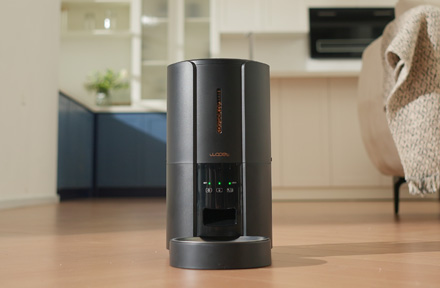
Troubleshooting Common Issues with Automatic Pet Feeders: Tips & Tricks for Pet Owners
Oct 26, 2023
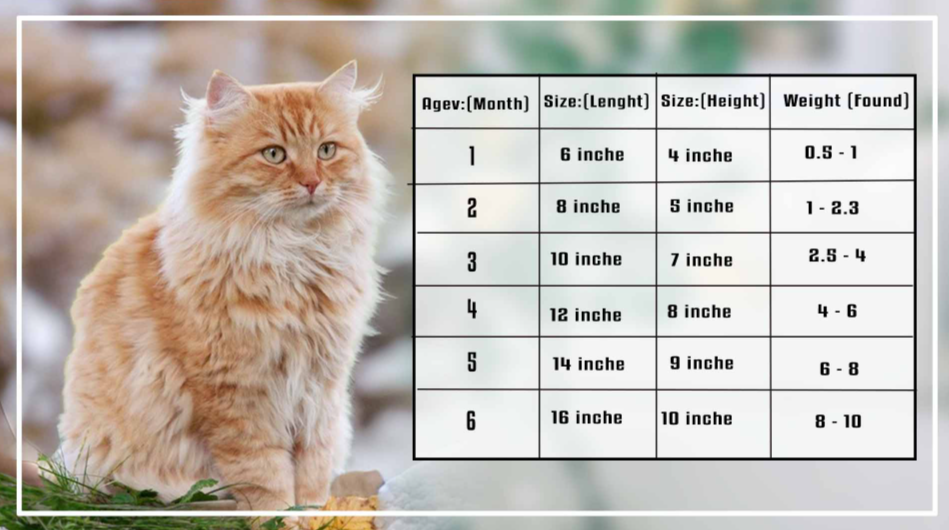
What is a standard Cat Weight chart by age Kg?
Mar 19, 2025

Why Does My Cat Cough After Drinking Water? 8 Potential Reasons
Mar 13, 2023
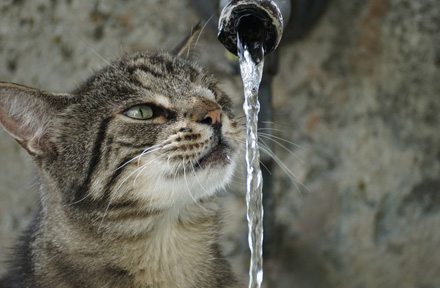
Why is My Cat Throwing up Water? Top 5 Causes Here
Feb 08, 2023
$109.99
$129.99
Copyright © 2025 WOPET. All Rights Reserved.